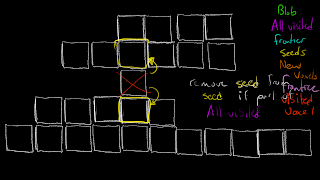Step Two: Try to sort those good ideas out.
I currently feel like I am failing terribly at step Two. The influx of good ideas is just too great. It is so fantastically easy to find interesting, useful sounding information in our connected age. It's the feeling of trying to fill a sieve with sand.
But anyways, I'll start here with two little ideas.
1. Public Goods - The stuff that I would like to make
Public goods are things that can be used by someone and their use does not in any way reduce the value that someone's else use has. This is non-rivalry. The second property is non-excludability. Meaning that is generally impossible to prevent people from consuming the good.
In the old days, things like lighthouses and roads are often thought to be Public Goods. Stuff that everybody can use and it generally doesn't hurt the other users of that good.
With the advent of the digital age suddenly an enormous amount of things have the potential to be public goods. Computers copy and broadcast all sorts of things with enormous ease. It's the nature of things in the digital age to be public good. The alternative will always require a battle, we see that with patents, lawsuits, drm and all that fun stuff.
What this brings me to is the realization that fundamentally the type of work that I would like to partake in would me Public Good work. This does not necessarily mean that I take the "good" word all that literally. It's not about applying what I think is "Good" to the public.
I feel drawn towards this concept because is that it so clearly lines up with the fundamental properties of our digital age, and any other direction forward would simply be fighting against a current.
2. Libertarianism - Providing unnecessary incentives
(note some of this information may not be accurate, the details should only be considered as hypothetical as further research suggests some of these ideas do not apply in Canada)
The government is capable of setting all sorts of rules, laws and taxes to suggest to people how they should live their lives. An example I heard about earlier was about the concept of marriage, and how the government, in creating tax and other rules surrounding marriage, could incentivizing it. And that just seems weird, and most importantly unnecessary. They are adding another layer of consideration to a question that should mainly be made between the two people in the relationship.
I can certainly see the need for a government to work as a legal support to marriage. They could provide the base contract that outlines the legal implications of marriage, and allow the two people to modify it in any way they both deem acceptable. But beyond that I guess I don't think they should have any involvement.
As I also heard today, things like passports don't in themselves hold any power, the real power comes in the ability for a passport to be taken away from you.
Kyler
In the old days, things like lighthouses and roads are often thought to be Public Goods. Stuff that everybody can use and it generally doesn't hurt the other users of that good.
With the advent of the digital age suddenly an enormous amount of things have the potential to be public goods. Computers copy and broadcast all sorts of things with enormous ease. It's the nature of things in the digital age to be public good. The alternative will always require a battle, we see that with patents, lawsuits, drm and all that fun stuff.
What this brings me to is the realization that fundamentally the type of work that I would like to partake in would me Public Good work. This does not necessarily mean that I take the "good" word all that literally. It's not about applying what I think is "Good" to the public.
I feel drawn towards this concept because is that it so clearly lines up with the fundamental properties of our digital age, and any other direction forward would simply be fighting against a current.
2. Libertarianism - Providing unnecessary incentives
(note some of this information may not be accurate, the details should only be considered as hypothetical as further research suggests some of these ideas do not apply in Canada)
The government is capable of setting all sorts of rules, laws and taxes to suggest to people how they should live their lives. An example I heard about earlier was about the concept of marriage, and how the government, in creating tax and other rules surrounding marriage, could incentivizing it. And that just seems weird, and most importantly unnecessary. They are adding another layer of consideration to a question that should mainly be made between the two people in the relationship.
I can certainly see the need for a government to work as a legal support to marriage. They could provide the base contract that outlines the legal implications of marriage, and allow the two people to modify it in any way they both deem acceptable. But beyond that I guess I don't think they should have any involvement.
As I also heard today, things like passports don't in themselves hold any power, the real power comes in the ability for a passport to be taken away from you.
Kyler



































